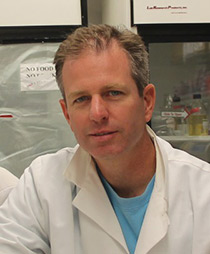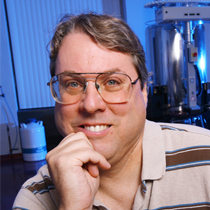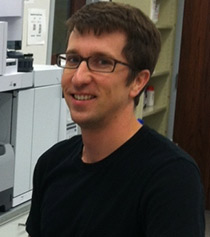The integrity of metabolic processes is critical for the function of every cell and tissue and determines normal body mass maintenance, blood glucose homeostasis, neurological function, and other fundamental systemic coordination. Aberrant physiological and biochemical mechanisms that compromise metabolic integrity create an imposing national economic burden through health care costs and are accordingly a significant area of emphasis in NIH programming priorities. Mentors focused on lipid transport and trafficking, macromolecular clearance in the liver, and impacts of perturbations to these functions on body mass regulation, fatty liver, and reproductive function naturally complement mentors examining molecular signaling and disease microenvironment.

Matthew Andrews
Director, Nebraska EPSCoR
Research focus: Molecular biology of mammalian hibernation.
University of Nebraska-Lincoln
Nebraska Innovation Campus
418 FIC
Lincoln NE 68588-6209
402-472-8946
Research interests
Research in my laboratory is directed toward the characterization of genes and small molecules responsible for the induction and maintenance of hibernation in mammals. Hibernation is seen in a wide-range of taxa including rodents, carnivores, insectivores, bats and even primates. Since the majority of species within these groups do not hibernate, it has been proposed that hibernation results from differential expression of genes common to all mammals, rather than the evolution of new genes unique to the hibernating species. We have used RNAseq and proteomics to identify genes and proteins that are responsible for the physiological characteristics of hibernation in the thirteen-lined ground squirrel Ictidomys tridecemlineatus. During hibernation body temperature is only a few degrees above 0oC, oxygen consumption holds at 1/30 to 1/50 of the aroused condition and heart rate can be as low as 3-10 beats/minute, compared to 300-400 beats/minute when the animal is active. Mechanisms by which hibernators avoid injury from these extremes are of great biomedical interest because of potential applications in the areas of traumatic brain injury, myocardial infarction, organ preservation, hemorrhagic shock and stroke. We have developed a hibernation-based therapy for hemorrhagic shock and are currently using hibernation strategies to develop new methods for organ preservation. Improvements in preserving donor organs has potential for increasing organ availability for patients on transplant waiting lists worldwide.
Research interests
Affinity-based separation of proteins or metabolites from a complex mixture is a powerful method for identifying and quantifying specific components. Such methods have additional utility for determining association constants and rate constants for protein-protein or protein-ligand interactions. Dr. Hage's laboratory has developed multiple novel and innovative methods for affinity separation and bioanalysis. For example, students have used heavy water labeling followed by protein digestion and mass spectrometry to characterize residues that preferentially react to immobilize the protein in specific conditions. The students relate the coupling through those residues to resultant activity of the protein, ensuring maximal conservation of function following immobilization. Ongoing projects in the Hage laboratory use this and other methods of chromatographic separation for forensics, immunoassays, hormone and drug detection and quantification, and other important applications.

Edward Harris
Professor of Biochemistry
Research focus: Liver endothelial scavenger receptor function; systemic clearance of heparin
University of Nebraska-Lincoln
Biochemistry Department
1901 Vine Street
Beadle Center N133
Lincoln NE 68588-0664
402-472-7468
Research interests
The liver is an absorptive organ with a highly specialized reticulated endothelium rich in a variety of cell surface scavenger receptors that clear circulating proteins, lipids, and other macromolecules. Dr. Harris has extensively characterized the stabilin class of receptors, due to its rapid and continuous endocytic clearance activity and strong affinity for heparin, heparin-like molecules, hyaluronan and other circulating glycosaminoglycans, as well as low-density lipoproteins and related ligands. Dr. Harris' laboratory has shown that stabilins have a critical role in heparin clearance, which has a strong biomedical impact because of the widespread use of heparin in many complex surgical procedures. Although a relatively new investigator, Dr. Harris has established strong collaborations to characterize the role of stabilins in clearing clinically relevant synthetic heparins.

Robert Powers
Professor of Chemistry
Research focus: Nuclear magnetic resonance (NMR) metabolomics.
University of Nebraska-Lincoln
Chemistry Department
722 HAH
Lincoln NE 68588-0304
402-472-3039
Research interests
NMR identification and quantification of cellular metabolite profiles in the presence of a variety of external stimuli is a powerful approach to examine molecular mechanisms and pathway flux in normal and diseased cells, tissues, organs, or biofluids. NMR methods can also be applied to examine protein conformational transitions, map protein-ligand or protein-protein docking interactions, and determine association/dissociation constants for such interactions. Research in Dr. Powers' laboratory is oriented toward development, validation, and application of new metabolite analysis techniques to examine disease mechanisms in collaboration with many labs at UNL, UNMC, and elsewhere. Students in his laboratory are currently working on projects that use bioinformatics, structural biology, and functional genomics to examine molecular docking, biofilm formation, assessment of drug activity and potency during and following inhibitor treatments in infectious disease and cancer models, and several other biochemical and biological questions. Much of Dr. Powers' work is directed at metabolomic analysis of human diseases.

Wayne Riekhof
Assistant Professor of Biological Sciences
Research focus: Lipid distribution and storage mechanisms.
University of Nebraska-Lincoln
School of Biological Sciences
1901 Vine Street
Beadle Center E141
Lincoln NE 68588-0666
402-472-8895
Research interests
Trafficking of lipids from the plasma membrane to subcellular organelles that process or store them is a critical process in membrane biogenesis and cell metabolism. Research in Dr. Riekhof's laboratory uses yeast as a model system to identify and manipulate components of lipid trafficking. Students in his laboratory are currently using the power of yeast genetics to define phospholipid synthesis and distribution pathways, which has broad implications in normal human metabolism and heart disease.
Research interests
Reproductive efficiency is directly impacted by nutritional status and overall metabolic homeostasis, which are reflected in the normal development and maturation of ovarian follicles. The Wood laboratory is providing molecular insights into pathologies such as polycystic ovarian syndrome using an innovative bovine model that mimics progression of the human disease. Student projects in Dr. Wood's lab are also centered on defining the crosstalk among signal transduction pathways that mediate dietary control of steroid flux and the role of these pathways in regulating ovulatory response genes.
Research interests
Fetal programming of muscle growth and metabolism. Our research goal is to gain a better mechanistic understanding of the adaptive fetal programming associated with intrauterine growth restriction (IUGR), which impairs postnatal growth and metabolic function in humans and animals. Students who train in my lab gain experience with producing and maintaining large animal models, performing surgical procedures and necropsy dissection, in vivo and ex vivo metabolic studies, cell culture studies, and molecular laboratory techniques that generate comprehensive fetal and neonatal information. Currently, we focus the bulk of our efforts on understanding muscle-centric programming events, which are not well-understood but have a key role in dysregulated glucose homeostasis and affect metabolic health at all stages of life.


